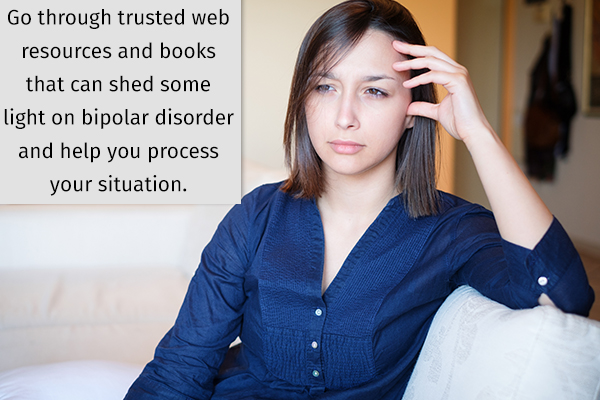In this article:
Bipolar disorder is a mental disorder marked by a dramatic change of moods in the affected individual. It is a chronic condition wherein the individual deals with unpredictable emotional upheavals ranging from intense happiness and energy to extreme sadness and depression.

These wavering thoughts and emotions can cripple the person mentally, often making him vulnerable to suicide. (1)
Bipolar disorder can affect both men and women irrespective of their belonging. About 1 in every 100 individuals is diagnosed with bipolar disorder at some point throughout his life.
The Diagnostic and Statistical Manual of Mental Disorders, 5th Edition (DSM-5), defines bipolar disorder as a “clinical course of recurring mood episodes consisting of one or more major depressive episodes and at least one hypomanic (bipolar II disorder)” or manic episode (bipolar I disorder). (2)
Bipolar disorder is a common disease that can occur at any age. It can develop mostly between the ages of 15 and 19 and around the age of 40 in rare cases.
People suffering from bipolar disorder go through a rollercoaster of moods that can be experienced as: (3)
- Mania: A manic episode is a period of temporary euphoria. It lasts for at least 4 days to weeks and can stretch for months at a time. During this distinct period, the affected person experiences an abnormally persistently elevated mood or irritable mood with increased activity or energy. The person may be hyperactive, working for long hours, indulging in risky endeavors, or taking up new projects.
- Hypomania: Hypomania is somewhat similar to mania. However, it is a less severe event.
- Depression: During a depressive episode, the person may experience feelings such as sadness or loneliness, loss of interest, lack of energy, overthinking, and sleeping a lot. This can create a gap in their personal and professional lives.
Bipolar disorder can have a significant impact on the life of the patient and his family as well. With all that a person experiences, bipolar can shatter professional lives, decimate personal relationships, and even interrupt education.
Types of Bipolar Disorder
There is no set pattern for the mood swings in an individual, and it may vary from person to person. Some people may experience several events, whereas some may undergo a few episodic interventions during their life.
Bipolar disorder can be distinguished into four types based on the behavioral patterns of an affected individual:
- Bipolar I disorder: This type is marked by a few maniac episodes. Although not necessary for diagnosis, a depression phase may accompany a mania in people affected by this type of bipolar disorder. For a definite diagnosis of this type, the duration of a manic episode must be severe, either lasting for 7 days at a stretch or resulting in hospital admission of the affected individual.
- Bipolar II disorder: People with bipolar II disorder have gone through at least one major depressive episode and hypomanic episode. Those with this type of bipolar disorder do not experience manic episodes.
- Cyclothymic disorder: This involves experiencing episodes of depression and hypomania. The symptoms experienced by people with the cyclothymic disorder are not as long or severe as the mania and depression experienced by those suffering bipolar I or bipolar II.
- Bipolar disorder, “other specified” and “unspecified”: This type is diagnosed when an individual’s behavior and symptoms do not agree with the criteria for bipolar I, II, or cyclothymia, but he has been experiencing mood changes that are significant enough to require a medical review.
Causes of Bipolar Disorder
The exact cause of bipolar disorder is not yet known. Some of the possible causes of and risk factors for this mental disorder are:
- A genetic predisposition
- Stress
- Hormonal imbalance
- An imbalance in brain chemicals
- Physical changes in the brain
- Drug or alcohol abuse
- Some traumatic experience
Signs and Symptoms of Bipolar Disorder
The episodes of high and low moods in bipolar disorder do not follow a fixed pattern.
Symptoms associated with the low phase (depressive period) may include:
- Feeling sad, hopeless, or worthless
- Loss of energy
- Having trouble concentrating
- Loss of interest in things
- Indecisiveness
- Crying
- Wanting to sleep more
- Insomnia
- Irritability
- Losing or gaining weight
- Thoughts of suicide or death
Symptoms experienced during the high phase (mania) may include:
- Restlessness
- Impulsiveness
- Alcohol or drug abuse
- Inability to make sound decisions or poor judgment
- Feeling excessively happy, excited, or hopeful
- A sudden switch from being joyful to angry or irritable
- Increase in energy levels
- Poor concentration
- Rapid speed
- Sleep issues
- Abnormally high sex drive
- Flirtatiousness
Standard Treatment for Bipolar Disorder
Although bipolar disorder is not curable, it can be managed with a blend of therapy, social support, prescribed medications, and lifestyle changes. (4)
Bipolar disorder is an illness that requires lifelong treatment to monitor the moods of the affected individual. Even though the patient feels fine, he should continue the treatment to prevent a relapse or an episode of the disease.
1. Prescribed medications
- Mood stabilizers such as lithium are used to stabilize the moods of the patient.
- Anticonvulsant medications that sometimes work in a similar way to antidepressants and antipsychotics.
2. Psychotherapy
This treatment is aimed at empowering an affected individual in the presence of a professional on how to tackle his situation by coming up with strategies to cope with the symptoms, suggesting ways to fight a depressive episode, and hearing out the individual.
Psychotherapy includes:
- Cognitive behavioral therapy
- Behavioral couples’ therapy
- Family-focused therapy
- Group psychoeducation
- Interpersonal therapy
- Psychodynamic psychotherapy
Talk therapies have been a successful approach in helping people with bipolar disorders to encourage mood stability, identify warning signs, and promote overall health.
3. Electroconvulsive therapy (ECT)
This therapy is tried in extreme cases when an individual’s body fails to respond to medication and talk therapy. ECT makes use of low electrical currents to stimulate the brain. It is mostly performed to tend to severe episodes of depression and at times to maniac events as well.
4. Hospitalization
People with bipolar disorder may require hospital admission in very critical situations. These include:
- Having a long period of experiencing depression or mania.
- Having psychosis or suicidal thoughts.
- Having a tendency to harm other people close by.
- The treatment demands intensive support.
Seek emergency care in the cases mentioned above.
Diagnosing Bipolar Disorder

It is imperative to seek professional help for anyone who observes the signs of bipolar disorder in him. It is difficult to diagnose the condition as there are no laboratory tests or scans to determine its presence in the affected individual.
Bipolar disorder can inadvertently be diagnosed as other depressive disorders and mental disorders such as attention deficit hyperactivity disorder (ADHD), posttraumatic stress disorder, and schizophrenia. To rule out this error, your doctor will take a record of your past and present experiences to analyze your condition.
Friends, neighbors, and family members can give an insight into the affected individual’s behavior. A proper diagnosis is required for any mental disorder to sidestep from adverse effects that can threaten the life of the affected individual and his family.
Self-Care for Bipolar Disorder
Living with bipolar disorder can be devastating, but it doesn’t have to reign over your life. Although you can’t handle the workings of your brain, you can take steps to make changes in your lifestyle and habits. This can help you fight and manage your moods to a great extent.
Note: It is imperative to consult a specialist for proper diagnosis and treatment of this condition. Aside from standard procedures, self-help and support can make it easier for you to manage the symptoms associated with bipolar disorder.
1. Self-Awareness

It is essential to understand the reasons behind your behavior and educate yourself on the condition to help yourself better. Going through all that bipolar disorder will arm you with the proper knowledge.
Go through trusted web resources and books that can shed some light on the disorder and help you process your situation.
This will give you an insight on how to manage your symptoms, the reason behind your behavior, and the path to living a normal life despite the illness.
2. Track your moods
Keep a watch on your symptoms. Once you have identified your triggers, it will be effortless for you to monitor your mood consciously.
This will help you overcome the changes in your mood much before they overtake you. It will be a slow and steady process, but you will start feeling better once you have caught a grip on your moods.
3. Cross off the stress box
Stress can have adverse effects on your mind and body that can reflect in your life. Managing stress is of primordial importance when it comes to staying healthy.
Engage yourself in activities such as regular deep-breathing exercises, meditation, yoga, and talk therapies to combat your stress.
4. Seek social support
Reaching out to your friends, family, and support groups can encourage you to share your apprehensions and get clarity on your condition. Your friends and family will be your support pillars throughout. Turning to help and confiding in your near and dear ones will cement your relationship all the more.
These people will be unquestionably caring and lend you a helping hand during your difficult experiences. This might take a lot of effort, but it will be worthwhile.
5. Make healthy choices

Taking care of your health is important while your body struggles internally with the chaos of the bipolar disorder. It is essential to incorporate healthy sleeping and eating habits and a regular exercise regimen to improve or maintain your physical health.
a. Sleep adequately
Individuals with a bipolar disorder should take just the requisite sleep of 8–9 hours, which restores the brain to function normally.
Sleep deprivation can trigger an episode. Sleeping for fewer hours has been identified with a worsening of related symptoms. This can often trigger mania in affected individuals.
Sleeping for fewer hours can be indicative of an upcoming episode, whereas sleeping more than the required number of hours is related to depression. (5)
b. Exercise regularly
Regular exercise can help your mood swings by releasing endorphins that help balance your mood. Physical exertion induces the release of cortisol hormones that are known to keep tabs on stress. Regular exercise can help alleviate bad moods, anxiety, and depression and can help you sleep better.
An exercise regimen of 30 minutes can help serve the purpose. Indulge in activities such as running, swimming, and aerobics to stabilize your mood.
c. Choose healthy foods
Eating a healthy wholesome diet can help uplift your mood and clear your thoughts. Make sure that you take regular meals. Skipping meals can worsen your situation.
- Include fish oil in your diet to boost your brain and help you manage depression. (6)
- Eat magnesium-rich foods. Magnesium works along the same lines as lithium. The advantage is that magnesium-rich foods do not have side effects like those of lithium. (7)
d. Avoid triggers
Restrict the consumption of food items, drugs, and beverages that can trigger an event. Smoking, sugar intake, soft drinks, and alcohol have been associated with adverse effects on the symptoms of bipolar disorder. (8)
6. Do not be impulsive
Bipolar disorder can lead you into making big decisions that you might regret later as a result of mood changes. Any impulsive decision or action might change the direction of your life. Make sure not to overload yourself with work. Set your priorities and work accordingly.
It is in your best interest to take the advice of your close ones before making critical decisions pertaining to your work, job, and personal and professional relationships.
7. Stick to a schedule

Following a set routine can help control your moods as experienced by many people suffering from bipolar disorder. If you are experiencing an emotional high, a routine will help you keep your calm.
During your low times, the need to follow your routine will keep you going. Your routine includes your daily activities, such as meal times, medicines, time for social gatherings, hobbies, exercise, and meditation.
How Can Friends and Family Be of Help?
With so much stigma attached to mental disorders, the need to offer constant family support is indispensable. Bipolar disorder is a struggle per se. It can also affect the people living with an individual suffering from bipolar disorder.
Friends and family can play a major role in helping a bipolar patient through their efforts:

- Try to understand the moods of the person and help him control the highs and lows of their feelings.
- Battling bipolar disorder can be straining for the individual and his family as well. Family-focused therapy can help family members have an understanding of the disorder.
- Prepare an action plan with the psychiatrist to control an impending manic episode.
- Because the patients have a tendency to inflict self-harm, be vigilant of red flags. Help them manage the warning signs that can result in an episode. Maintain a journal to track the patient’s behavioral patterns. You can write about how the individual has been feeling, the intensity of the feelings, and the irrational or risky behaviors as observed throughout the day. Share this information with the support group and health care provider to create a treatment plan ahead of a manic episode.
- If, despite all the efforts, a persistent risky behavior is observed in an affected individual, consult the doctor to adjust his medications accordingly.
- Make sure that the patient gets enough sleep to help clear his mind of any toxic and negative thoughts.
- Triggers such as alcohol and drugs are toxic to an individual suffering from bipolar disorder. These can intervene with the treatment and should be avoided.
- Bipolar disorder can be challenging at all levels for the patient’s family members, spouse, friends, and other caregivers. To help them stay calm, they too need to find support and take care of themselves to reduce stress.
- Coping with a mental disorder can be exhausting with all the tribulations going inside the patient’s head. It is advised to be patient and caring towards the affected individual. You can pitch in your contribution towards his recovery by:
- Trying to engage in conversations with the person and listening to what he would like to say.
- Keeping a positive mindset. This will help you handle the mood swings of the person. Be patient in your care. Accept that the reason behind this is the disorder and not the person himself. Losing patience or calling out the patient will only worsen the situation.
When to See a Doctor
Consult immediate medical review if you observe any signs of a manic episode in your near or dear ones. Getting treatment at the right time will prevent the symptoms from aggravating and make a significant contribution to a person’s mental health.
Several people are oblivious to the illness residing in them and would be reluctant to consider a visit to the doctor. It is necessary to drive them to a consultant’s office to get a diagnosis for the same. They might be thankful to you for your efforts later on.
Any person living with bipolar disorder should seek immediate medical help in case of long periods of depression to evade the risk of self-harm and suicide.
Final Word
Being diagnosed with bipolar disorder is not the end of the world. Family involvement can help you accept your situation, process the need for treatment, and recognize your mood changes.
Being down with this disorder can render an individual emotionally challenged. If you are a family or friend of an affected individual, try to understand his situation and be calm in your responses.
Besides regular medical treatment and psychotherapy, family support, regular checkups, medications, and consistent self-help efforts are your arsenal to fight the battle against bipolar disorder.
- Was this article helpful?
- YES, THANKS!NOT REALLY


